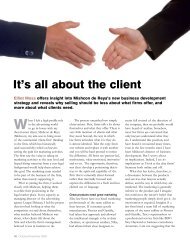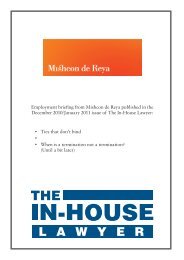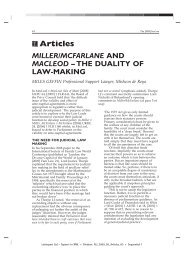Download PDF - Mishcon de Reya
Download PDF - Mishcon de Reya
Download PDF - Mishcon de Reya
Create successful ePaper yourself
Turn your PDF publications into a flip-book with our unique Google optimized e-Paper software.
A selection of <strong>de</strong>alsour Real Estate grouphave advised onover the last yearActing for funds advised by<strong>de</strong>veloper Delancey and Invistaon the <strong>de</strong>velopment of theprestigious Rolls Building in FetterLane, London EC4. This willhouse the new CommercialCourt, which will handle workun<strong>de</strong>rtaken by the ChanceryDivision, the CommercialCourt and the Technologyand Construction Court. Weare currently <strong>de</strong>aling with theongoing letting programme forthe upper floors of the building.Advising on the sale of the300,000 sq ft O2 Leisure andRetail Centre in Finchley Road,London NW3, for longstandingclients Matterhorn Capital andPalos Investments for £125.9million to Land Securities. Alsoacting on the acquisition of aportfolio of hospitals operated byand leased to Spire Healthcarefor £54.5 million from QuercusHealthcare.Acting for investment vehiclesbacked by Foxtons foun<strong>de</strong>r JonHunt in the purchase ofinvestment properties to thevalue of £100 million plus. Themost recent was the £23 millionpurchase of 147/150 High Holborn,London WC1, from the Pru<strong>de</strong>ntial.Others were the purchase ofMacmillan House in Kensington,London W8, for £60 millionand 77/95 Victoria Street,London SW1, for £20 million.Net-a-Porter and Gymbox at Westfield LondonActing for leading luxury onlinefashion retailer Net-a-Porter onits 15 year lease of 42,000 sq ftof new office space for its LondonHQ at Westfield London, abovethe shopping centre’s luxury village.Also acting for Gymbox on thelease of its 19,650 sq ft state ofthe art flagship gym at WestfieldLondon which will open next year.Acting for niche <strong>de</strong>veloperManhattan Loft Corporationon various <strong>de</strong>velopmentsincluding the acquisition, jointventure and <strong>de</strong>velopment ofEdison House, London NW1,and a new boutique hotel inMarylebone, London W1.Advising Manchester-basedCitybranch on its joint venture<strong>de</strong>velopment with DevelopmentSecurities of a mixed use schemeat Hale Barns in Cheshire. Thescheme, which will have anestimated completion value of£35 million, will inclu<strong>de</strong> there<strong>de</strong>velopment of the SquareShopping Centre as asupermarket-led scheme.Acting for Moscow-basedrestaurant group Novikov onits lease of 50 Berkeley Street inMayfair, London W1. The 19,000sq ft former Grand Prixrestaurant will be a UK <strong>de</strong>butfor Novikov Restaurant Group,which has 30 restaurants inRussia.1
HARNESSING THE WAVE(and the sun and the wind and the...)2
AdjudicationInnovationWe live in changing times,especially when it comesto adjudicating inconstruction disputesEven when faced with a process thathas been extensively litigated overfor the past 13 years, and which isnow the subject of new legislation,the courts are still able to adopt anew approach and change acceptedpractice. Some of the recentlyappointed judges in the Technologyand Construction Court (TCC)have <strong>de</strong>veloped the law relating toadjudication along unexpected lines.Although this can make it somewhathar<strong>de</strong>r for lawyers to advise onexactly how an adjudicationmay end, it does indicate thatcourts are moving away from theirpreviously fairly inflexible approach.In December 2009, in a case in which<strong>Mishcon</strong> <strong>de</strong> <strong>Reya</strong> was involved(Enterprise Managed Services Ltdv Tony McFad<strong>de</strong>n Utilities Ltd), theTCC first indicated that some caseswere too complicated to be resolvedin a 28 day adjudication. The judgeconclu<strong>de</strong>d that if a <strong>de</strong>cision couldnot be reached impartially and fairlywithin the time limit, then anadjudicator should resign and leavethe parties to fight elsewhere. Howthat sits alongsi<strong>de</strong> the often-quotedstatutory requirement to permitparties to refer disputes toadjudication “at any time” is yet tobe seen.This interference in the right toadjudicate was again <strong>de</strong>monstratedin Mentmore Towers Ltd v PackmanLucas, another recent case in which<strong>Mishcon</strong> <strong>de</strong> <strong>Reya</strong> acted. Here, theTCC took the rare step of grantingan injunction to prevent the taking12 8
ROUNDTABLEDISCUSSION‘‘This edition of PropertyMatters is about “catchingthe wave”, which for usrepresents the importanceof split second timing, of graspingopportunities as they arise, the needfor an element of courage and theinfl uence of change and innovation.It is early days and we are only justbeginning to get to grips with theimplications of the new Government’splans but we do know that they willhave a wi<strong>de</strong>-ranging effect on allaspects of the way we and ourclients do business.Daniel Lipman: The property marketcontinues to be driven by the availabilityof cash. We can see that the clients whowe acted for on commercial investmentpurchases last year have really reapedthe benefi ts and many have alreadyturned these for a substantial profi t,sometimes in a matter of months. Thisreally shows the crucial role of timingand the need to have the confi <strong>de</strong>nceto grasp the available opportunitiesquickly.Nick Minkoff: Of course fundingcontinues to be an issue but we arefi nding that clients with a proven10track record are able to source funding,although LTVs are more cautious. Forthe banks it’s very much back to thebasics of bank lending, which frequentlyseemed to go by the board in the headydays prior to the fi nancial meltdown.Effectively the most active len<strong>de</strong>rs inthe market are those without legacyissues. The recent De Montfort reporthighlights the huge funding gap. Around£50 billion of UK commercial propertyloans are in breach of their fi nancialcovenants or in <strong>de</strong>fault, with a further£160 billion of <strong>de</strong>bt due for repaymentover the next fi ve years. No one knowshow the banks and the market will<strong>de</strong>al with this potential time bomb.Ian Paul: In the next 12 months we doexpect to see more UK funds andoverseas investors bidding for sites.But opportunities are still limited. Wehave been acting on numerous newfund set ups and for existing funds. Sofar, the banks have been reluctant toforce sales and the status quo has beenhelped by a low interest rate environmentwhich is in contrast to the last recession.But, as land prices rise, we are likelyto see more distressed assets comingonto the market. As always timing willbe everything.Stephen Hughes: The dynamics of the<strong>de</strong>velopment process have been changedby the scarcity of <strong>de</strong>velopment fi nanceand the amount of equity that clients nowhave to fi nd. Banks are more cautiousand although funding is available forpre-let commercial <strong>de</strong>velopment itis not readily available for speculative<strong>de</strong>velopment. We are going to runinto a real shortage of <strong>de</strong>velopmentsupply, particularly in central London.But we are beginning to see signs of areturn to <strong>de</strong>velopment, with schemesbeing dusted off and a few skyscraperprojects back on track. For those withequity there will be opportunities tomake good returns.Daniel Farrand: It’s clear that for<strong>de</strong>velopers the sustainability agendawill remain on track <strong>de</strong>spite theeconomic downturn. Interestingly it isoften the corporate occupier orretailer driving the sustainabilityagenda and insisting that <strong>de</strong>velopersmeet their standards and the largecorporates have to tick the CSR boxif they are to move their staff to newpremises. Green leases are <strong>de</strong>fi nitelynot a luxury and occupiers areincreasingly aware of what they arespending on energy.
Daniel Levy: Now more than ever isthe time for working existing portfolios.Our clients have had to be moreresourceful and we have been helpingto create value by using the right toolsin the litigation kit to put them at thefront of the queue when tenants runinto fi nancial diffi culties, do not wishto settle their liabilities quickly orwhere opportunity exists and needsfi rm pressure for it to be realised. Wehave an assertive style, make good onour threats and work to ensure thatlitigation – like investments – pays areturn for it to be continued. Inevitablywe are acting on more dilapidations,break clauses and professional negligencecases; and prepacks and CVAscontinue to be an issue.Dean Poster: A further symptom ofthe cycle is the number of propertysector takeovers and mergers and therewill no doubt be further consolidationin the sector. For these to work it’simportant that they are cultural matchesas well as a good fi t fi nancially. It is atime of opportunity and a downturnis traditionally a time when many<strong>de</strong>ci<strong>de</strong> to go it alone. So it comes asno great surprise that a number ofstars have been leaving propertycompanies and agencies to pursuenew opportunities.Nick Doffman: We are fi nding thatproperty investors are increasinglygetting together to form “club”arrangements. For instance that puttogether by Moor Park CapitalPartners to carry out their €403million purchase and leaseback of378 Spanish banks. The club inclu<strong>de</strong>sAnthony Lyons’ and Simon Conway’sMatterhorn Capital, the Livingstonebrothers’ London & Regional, Londonbased Ombeter Properties and twohedge funds, Och Ziff and Fortis.Others are also using a personalapproach to raising equity rather thangoing down the traditional route ofemploying a placement agent.Susan Freeman: And the willingnessto form new relationships has givenus the opportunity to add morevalue in our role as facilitators. Weare able to leverage our connectionsto bring investors together and tointroduce new sources of equity. Wehave also been seizing someopportunities of our own. Recenthires into our real estate groupinclu<strong>de</strong> fi ve new partners andassistants from City fi rms which hashelped put us in a strong position tori<strong>de</strong> the next wave.Ned El-IMad: Our resi<strong>de</strong>ntial teamhas found that prime central Londonresi<strong>de</strong>ntial property has continued toperform well. The market has beenbuoyed by overseas investors,particularly from Asia. They areattracted by a favourable exchangerate and a preference to have theirmoney in bricks and mortar rather thanattracting minimal interest in the bank.Nick Doffman: Of course Londonhas its own specifi c issues. It is vitalthat London remains an attractiveenvironment for international business.The new banking levy or anunattractive tax regime could easilyput London at a competitivedisadvantage as a world fi nancialcentre. New <strong>de</strong>velopment is essentialto the capital’s growth and it is good tosee a wave of opportunities comingthrough in the wake of the 2012Olympics such as Capital & Counties’re<strong>de</strong>velopment plans forEarls Court and Olympia– a scheme bigger thanCanary Wharf.‘‘11
In today’s challenging retail environment, there is one smallpiece of good news for shopping centre operators: since theHigh Court’s <strong>de</strong>cision in Land Securities plc v Registrar ofTra<strong>de</strong> Marks, it is now much easier to register tra<strong>de</strong> markssuch as “Westfield”, “Meadowhall” and “Bluewater” for themultifaceted services offered by a mo<strong>de</strong>rn shopping centre.It is only in the last <strong>de</strong>ca<strong>de</strong> that the UK IntellectualProperty Office (UK IPO), the government bodyresponsible for administering the system of registeredtra<strong>de</strong> marks, has started to recognise the concept of“retail services”.Prior to that, a large scale retailer, such as Sainsbury’sor Debenhams, could only seek protection for theirtra<strong>de</strong> marks in relation to the own brand goods thatwere sold within their stores. This greatly increased thecost of protection as it would necessarily encompassmany of the 34 official “classes” of goods with theresulting multiple official class fees.This led to a logical tension, in that many retailers whodid not produce “own brand” products never actuallyused their tra<strong>de</strong> marks upon the goods they sold, whichalways bore the tra<strong>de</strong> marks of their end producers.12
The acceptance of “retail services” as a form of service,in relation to which a tra<strong>de</strong> mark could be applied,provi<strong>de</strong>d a sensible basis for the registration of thetra<strong>de</strong> marks of supermarkets, <strong>de</strong>partmentstores and shopping centres. Howeverthe complex wording that the UKIPO was willing to endorseonly applied in relation tothe goods being sold. Noprotection was available forthe many “value ad<strong>de</strong>d”offerings that are to befound in mo<strong>de</strong>rn shoppingcentres, such as Lakesi<strong>de</strong>,Bluewater and Westfield.The current state of playThe Land Securities case paved the way forthe protection of tra<strong>de</strong> marks in relation to diverseservices provi<strong>de</strong>d within a shopping centre or mallsuch as restaurants, cinemas, child care, languageassistance and car cleaning.This <strong>de</strong>cision acknowledged the fact that all of theseservices may be provi<strong>de</strong>d within the mo<strong>de</strong>rn shoppingcentre environment, and form an integral part of theoffering. However, it also recognised that the provisionof, for example, entertainment services in this settingis perceived differently from a cinema that is notoperating un<strong>de</strong>r the umbrella of a shopping centre.Why this is importantMo<strong>de</strong>rn shopping centres are becoming less of a locationand more of a <strong>de</strong>stination. Rather than simply being acollection of shops, the mo<strong>de</strong>rn shopping centre alsoprovi<strong>de</strong>s a mixed range of entertainment opportunitiesand other value ad<strong>de</strong>d services.This provi<strong>de</strong>s a bricks and mortar retail equivalent of a“multi-media experience” and gives the shopping centresomething to offer over their internet competition.This can intru<strong>de</strong> even further into the “etail” field withassociated social networking support promoting events,product/collection launches, special offers and servicesincluding guiding a user around the individual retail unitsto “get the look” – providing a real world version ofthe approach taken by online retailer ASOS.As such there is increasingly much more of a “lifestylefeel” surrounding shopping centre brands that has themoperating on a much higher level than simply a name ona motorway exit sign. Global brands such as “Westfield”are no longer used for one-off <strong>de</strong>velopments, butare reproduced and transferred across multiple sitesin many countries.UK tra<strong>de</strong> mark registration provi<strong>de</strong>s a high level ofsecurity for a brand owner in terms of expandingand operating across the UK un<strong>de</strong>r their tra<strong>de</strong> marks.By contrast, any reliance on common law rights suchas passing off is strictly limited to the area in whichyou are already established.This freedom to operate is clearly valuable to bothpotential investors in and purchasers of any shoppingcentre or mall operating company. Proper tra<strong>de</strong> markregistrations can therefore represent valuable assetsfor such a business.In addition, a carefully planned IP protection strategyhas the potential to prevent competitors taking a “freeri<strong>de</strong>” on the back of a retailer’s marketing efforts,including distinctive aspects of the <strong>de</strong>sign and “tra<strong>de</strong>dress” of the retailer’s environment. If used carefully,this can help to maintain a real competitive advantage.It will be interesting to see where the <strong>de</strong>velopingconcept of “retail services” takes us next. There iscertainly scope for a stronger brand focus in other“umbrella” <strong>de</strong>velopments such as outdoor retail parks.There may even be scope to apply a similar logic toprestigious resi<strong>de</strong>ntial <strong>de</strong>velopments where a strongon-site value ad<strong>de</strong>d service offering, such as a gymor restaurant, forms a unique selling point.Simon StanesTra<strong>de</strong> Mark Attorneysimon.stanes@mishcon.comTel: +44 (0) 20 7440 473413
PRESCRIPTIONS FORFAST-ACTING RELIEFThe tax aspects of aproperty transactionshould always beconsi<strong>de</strong>red carefully,but never more so thanin the current market.Both sellers and buyersneed to be aware ofthe opportunitieswhich are available toenhance their returns,and must likewise befamiliar with the pitfallswhich can diminish them.What is “consi<strong>de</strong>ration” forstamp duty land tax purposes?Stamp duty land tax (SDLT) arisesby reference to the “chargeableconsi<strong>de</strong>ration” given for atransaction. This inclu<strong>de</strong>s the pricepaid by a buyer; this much isobvious. However, in the SDLTworld, life is never straightforward,and there are various occasionswhen SDLT is due by referenceto the “market value” of the landrather than by reference to theactual price paid. Here are threeexamples of when this may apply.1. Transfer to a connected companyindividuals from transfering land toa company for £1 (with no SDLT)and then selling the shares in thecompany, giving rise to only 0.5%stamp duty (if a UK incorporatedcompany) or potentially no stampduty at all (if a non-UK incorporatedcompany). Of course, transfersbetween companies in the samegroup may be eligible for SDLTgroup relief, which will need to beconsi<strong>de</strong>red on a case by case basis.2. ExchangesAnother example is a sale andleaseback. At fi rst glance, the“market value” rule may not appearto make much difference – in anarm’s length arrangement, themarket value of the land acquiredby the buyer will surely be theactual price paid. However, there isa key difference with market valuetreatment. SDLT is normally due onthe VAT-inclusive price but, wherethere is a market value imputation,SDLT is due on the VAT-exclusiveprice only. On a £10 million property,a VAT-exclusive price will mean asaving of £70,000. HM Revenue &Custom’s (HMRC) reasoning foradopting this treatment is that VATcannot arise on a hypotheticalprice and must therefore beignored – a useful interpretationfrom a taxpayer’s point of view.This “market value” rule applies whenland is transferred to a “connected”company – broadly a company whichthe seller controls. This is to stop3. Building worksThe <strong>de</strong>fi nition of “consi<strong>de</strong>ration”for SDLT purposes is very wi<strong>de</strong>,14
and inclu<strong>de</strong>s all “money or money’sworth given” for the transaction bythe buyer or a person connectedwith the buyer.A buyer of land who agrees withthe seller to pay a premium andalso agrees to <strong>de</strong>velop a schemeon the site will, as a starting point,be liable to SDLT not only on thepremium but also by reference tothe value of the building workswhich are to be carried out. However,there is a specifi c relief whichallows building works to be ignoredprovi<strong>de</strong>d certain conditions are met.One condition is that the worksbe carried out on land “acquiredor to be acquired” un<strong>de</strong>r thetransaction or on other land held bythe buyer. While this should not poseany immediate problems in respectof the scheme in the above example(since the buyer is constructing onland it will acquire) problems occurwhen, for example, the seller requiresthe <strong>de</strong>veloper to construct buildingson land owned by the seller. In thiscase, the fi rst condition has not beenmet and so SDLT arises on themarket value of these buildingworks. Although there is no easyfi x, a buyer should consi<strong>de</strong>r whetherit can renegotiate the commercial<strong>de</strong>al so that it gets a lease of theland on which the building is to beconstructed. Still, it is vital to keepin mind the SDLT anti-avoidanceprovisions.mindful that opting is a two stageprocess – the landlord must makethe <strong>de</strong>cision to opt, and then notifyHMRC. It is essential that theseformalities are observed, as the TaxTribunal is littered with examples ofcases where HMRC has refused toaccept that a person has opted to taxas a result of the procedures not beingadhered to. This can be disastrousfrom a VAT recovery point of view.You should also consi<strong>de</strong>r carefullywhether a transaction can qualifyas a Transfer of a Going Concern(TOGC), which presents both acash fl ow and SDLT saving (sincea TOGC is outsi<strong>de</strong> the scope of VAT).People are sometimes surprised tolearn what can comprise a TOGC.The legislation dictates that the sellermust be carrying on an “economicactivity” which will be carried on bythe buyer. In theory, a bare site whichhas a huge <strong>de</strong>velopment value maystill qualify as a TOGC if the sellerhas let a small corner to a tenant foronly £1,000 per month (perhaps touse as a car park).Tax issues are complex butimportant to un<strong>de</strong>rstand. Ensuringthat transactions are structured ina tax-effi cient manner, and that allavailable tax reliefs and exemptionshave been used in the most effectiveway, could save you more than yourealise.VATA landlord of commercial premisesmay wish to “opt to tax” so that it cancharge VAT to tenants (the rationalebeing that it can then recover itsassociated VAT costs). However, beJonathan LeggPartner, Real Estate Taxjonathan.legg@mishcon.comTel: +44 (0)20 7440 709215
A VERY TANGLED WEBThe perils of social networking in the workplaceA wave of virtual networking platformsis providing numerous opportunities toexpand business and social relationships.Facebook alone has more than 400million active users globally, according toits website, and a third of all internet userslog on to Facebook in any given day.However, as the Tra<strong>de</strong>s Union Congress(TUC) has noted, employers are notsure how to respond to the challengesposed by social networking sites. It fearsthat the UK’s Facebook users are “HRacci<strong>de</strong>nts waiting to happen”. So whatcan go wrong?16Unlawful discriminationin recruitmentEmployers should be aware that if theyvet applicants by checking their socialnetworking homepages, they run the riskof inadvertently discovering sensitiveinformation about the individual, leadingto claims of unlawful discrimination.Employers should carefully consi<strong>de</strong>rwhether they need to run ‘Facebookchecks’. They may <strong>de</strong>ci<strong>de</strong> to limit thechecks to certain roles and only runthe checks late in the process. To avoidfalling foul of data protection legislation,the employer should inform the applicantof their intention to vet them, and weigh upwhether the advantages gained are worththe potential claims that may follow.Cyberbullying andvicarious liabilityEmployers may also face claims ofunlawful discrimination in relation tocyber bullying – where employees postbullying (and often discriminatory)comments online about their colleagues.The employer may potentially be heldliable vicariously for its employees’ conduct.The best way of protecting against suchclaims is to put in place a policy which<strong>de</strong>als with conduct, to communicate thispolicy to employees, to train managersin relation to equal opportunities andharassment issues and to take appropriatedisciplinary action against the perpetrators.Monitoring anddisciplinary proceedingsThere are numerous instances in whichemployees have been sacked for posting<strong>de</strong>rogatory comments relating to theiremployer or customers, as well as a numberof “hangover” dismissals – where an employee’sabsence has been candidly explainedin their status update and does not tallywith the explanation given to the employer.While employers may use evi<strong>de</strong>nce gainedfrom websites to support <strong>de</strong>cisionsthey take about staff, employers shouldbe careful how this is obtained. Theprivacy settings of social networking sitesmay make it difficult for them to obtainthe evi<strong>de</strong>nce by chance; if informationis given by a colleague of an employee,that colleague may face liability forbreaching their “friend’s” confi<strong>de</strong>nce.One way in which evi<strong>de</strong>nce may beobtained and abuse of the system maybe controlled is through monitoring. Ifthe employer <strong>de</strong>ci<strong>de</strong>s to monitor internetusage, this needs to be approached withcare as unlawful monitoring can resultin custodial sentences and large fines.Monitoring must be proportionate,communicated to employees andhandled with appropriate technicalsafeguards. This is also relevant if anemployer wishes to control employees’usage of social networking sites.Data theftIn our recent experience, 7% of all casesof data theft involved the misuse of socialnetworking sites. Typically, employeesinvite the business’s customers to betheir contacts on sites such as LinkedInshortly before leaving their employer,thereby retaining confi<strong>de</strong>ntial informationpost employment.We have obtained injunctions againstemployees who have misused theiremployer’s information in this way, butthis process can be complicated if theemployee has an account un<strong>de</strong>r apseudonym or the service provi<strong>de</strong>rsof the websites are based in otherjurisdictions.What steps shoul<strong>de</strong>mployers take?Employers need to put in placepractical usage policies which clearlyexpress their expectations. They shoul<strong>de</strong>nsure that their contracts containsensible confi<strong>de</strong>ntiality provisions androbust, enforceable restrictive covenants.If employers allow employees accessto social networking sites but areconcerned these may be used otherthan purely for networking purposes,they should consi<strong>de</strong>r requiringemployees to set up work-onlyaccounts that are relinquished whenthey leave the firm.Above all, employers need to recognisethat the way in which the web is beingused is changing, and that they shouldtake care to keep up with these changes.Will WinchSolicitor, Employment Groupwill.winch@mishcon.comTel: +44 (0) 20 7440 7292
Start-ups and breakIn a time of change what are thelegal consequences for employers and employees?upsAs a new political climate sweepsacross the country, many in theproperty industry are consi<strong>de</strong>ringleaving their existing employmentand setting up their own businesses.In recent months, teams have beenspringing up from DTZ, CBRE, Savillsand others, spawning new agenciessuch as Hanover Green, H2SO andMMX. A number of start-ups havealso emerged from the ranks of ourlargest property REITs.People are seizing the opportunities inthe belief that the bottom of the propertycycle has arrived or is even behind us,and that 2010 is an opportune time toleave the confines of the large agencyor property company and set upbusiness themselves. But both employeesand employers who are affected shouldseek legal advice at an early stage.PREPARING FOR DEPARTUREEmployees will need to carefully consi<strong>de</strong>rthe duties and obligations to their currentemployers. The relevant provisions willbe found in the employment contract.There are likely to be a number ofrestrictive covenants which are inten<strong>de</strong>dto protect the employer’s business from<strong>de</strong>parting employees - in particular,there may be provisions prohibitingan employee from competing with hisor her employer during and afteremployment and, following its termination,from soliciting clients and poachingstaff. There are also likely to be expressprovisions relating to confi<strong>de</strong>ntiality.CONTACTING CLIENTSIn many cases, employees will only bewilling to take the risky step of foregoinga regular monthly pay cheque for astart-up operation (and in the first year,a minimal income) if they know thattheir clients are likely to join them.Inevitably they will have ma<strong>de</strong> informalapproaches to their closest clients togain comfort that they will be followedto the new venture. Clients on occasionwill also approach the employee tosee if they are willing to leave theiremployment and set up on their ownin or<strong>de</strong>r to reduce cost, while keepingthe same personalised level of service.However, employees who discuss theirfuture plans with clients are likely to beacting unlawfully. It is easy to get caught.There are instances where employeesbelieve that their Hotmail or Yahooaccounts through which they have ma<strong>de</strong>their <strong>de</strong>parture arrangements are secure,only to find that the employer has(whether lawfully or unlawfully) hackedin to their email accounts and locatedtheir plans to <strong>de</strong>part. They may thensuspend the employees and threatento injunct the new venture fromcommencing business. Employers mayalso notify potential fun<strong>de</strong>rs of thenew business that the <strong>de</strong>partees aresubject to enforceable restrictions infavour of the employer and that theproposed fun<strong>de</strong>rs would be inducinga breach of contract if they continuedwith their funding.This is not the best start to a newventure. Experience shows that wherea well fun<strong>de</strong>d employer wishes toenforce its rights as a point of principleand to scare off other potential<strong>de</strong>partees, suspension from thebusiness, threatening solicitors’ lettersand the threat of an injunction maymean that the new venture nevergets off the ground. Often, the<strong>de</strong>parting employees are also unableto continue with their existingemployment.In addition, teams planning to leavetogether to join a new start-up or arival must take extra care to ensurethat they are not in breach of theirobligations to their employer. Recentcase law confirms the courts’ willingnessto protect employers in this situation.LEGAL STRUCTUREFOR THE NEW BUSINESSThere is a growing move towardsstart-ups using LLP structures asopposed to limited companies. LLPsallow members (partners) to enjoythe same tax status as if they werepartners in a partnership, while affordingthem limited liability protection.Another important benefit is the savingof up to 13.8% for employers’ nationalinsurance contributions on members’salaries. An LLP agreement will needto be negotiated among the members.COMPROMISE WITHEMPLOYERS - NEGOTIATIONRegardless of the restrictions imposed onemployees, once the sense of betrayaland disloyalty has passed, employers oftenrealise that, while they may legally be ableto prevent the <strong>de</strong>partee from workingfor their clients, they cannot force theclients to continue to instruct them. Inmany cases, the employers are multidisciplinary organisations that work withtheir clients in a number of areas, andthe start-up can only cover one aspectof the work. The relationship betweenemployer and client could be harmedif the employer treats its employees badly.After any hostilities have been overcome,arrangements for fee-sharing, mutualreferrals, consultancy agreements andpermissions to take junior staff are allmatters for potential negotiation.Dean PosterPartner, Corporate Group<strong>de</strong>an.poster@mishcon.comTel: +44 (0) 20 7440 477217
MISHCON INTHE PRESS<strong>Mishcon</strong> <strong>de</strong> <strong>Reya</strong> has launched a unique range of products,un<strong>de</strong>r the umbrella MISHCON PROTECT, <strong>de</strong>signed toreduce the cost of litigation. The scheme protects clientsagainst the risk of having to pay opponent’s costs, and theirown disbursements, should a claim not succeed.The Lady’s not for inviting to tea<strong>Mishcon</strong> <strong>de</strong> <strong>Reya</strong> opened its New York offi ce in January2010 to provi<strong>de</strong> a Rolls-Royce litigation service to clients.Squatters who set up home in a £12m Belgravia housewithin sight of Baroness Thatcher’s Chester Square, SW1,resi<strong>de</strong>nce must be regretting sending her a cheeky noteinviting her round for tea. When bailiffs arrived to retakepossession and change the locks last week, they were accompaniedby members of the Iron Lady’s heavily armedsecurity <strong>de</strong>tail as well as Belgravia police.<strong>Mishcon</strong> <strong>de</strong> <strong>Reya</strong>’s head of property litigation, Dan Levy,who acted for the owner, said: “The client was please<strong>de</strong>nough we obtained an or<strong>de</strong>r in a record 14 days, but tohave Baroness Thatcher’s security <strong>de</strong>tail lend a hand wasa real plus. I guess it’s all part of community policing inBelgravia.” Estates Gazette, 24 October 2009<strong>Mishcon</strong> <strong>de</strong> <strong>Reya</strong> co-hosted another in its series of events withProperty Week. The latest, entitled “Landlord’s Masterclass:Essential Tricks of the Tra<strong>de</strong>”, lifted the veil on the secrets ofgetting the most out of your property portfolio. The eminentpanel inclu<strong>de</strong>d Jonathan Seitler QC, Daniel Levy, head of realestate litigation at <strong>Mishcon</strong> <strong>de</strong> <strong>Reya</strong>, and Tony Lorenz of theLorenz Consultancy. An invited audience engaged in a livelyQ&A session chaired by Property Week editor Giles Barrie.Hunt marks return to resi<strong>de</strong>ntial market – a profile of JonHunt by Daniel Thomas (Financial Times, 19 August 2009)“Mr Hunt is a diffi cult man to pin down, agreeing to thisrare interview on the recommendation of <strong>Mishcon</strong> <strong>de</strong><strong>Reya</strong>, his longstanding legal advisers.”The 2010 Norwood Property Lunch, which attracted more than500 professionals from some of the country’s biggest fi rms,beat its previous records by raising an outstanding £500,000.As confi<strong>de</strong>nce returns to the M&A market, the FinancialTimes has launched ‘Deals and Dealmakers’, an editorialseries supported by <strong>Mishcon</strong> <strong>de</strong> <strong>Reya</strong>. This is the first timea law firm has partnered with the FT on a publishing project.Our Real Estate Teamatten<strong>de</strong>d MIPIM 2010.Susan Freeman againprovi<strong>de</strong>d a daily blogof the week longevent for PropertyWeek’s website.Richard Desmond (guest speaker and Norwood presi<strong>de</strong>nt), Susan Freeman(Norwood co-chair), Piers Morgan (guest speaker), Michael Goldstein(Norwood co-chair)20
The Twenty Ten PartyThe <strong>Mishcon</strong> <strong>de</strong> <strong>Reya</strong>Real Estate group hostedtheir annual party atSummit House.Braving torrential rain,a record 300 guestsjoined us to sharetheir predictionsfor the year ahead.Mark Smith (Mapeley), Jamie Hopkins (ChesterProperties), Paul Collins (Mapeley), Nick Minkoff(<strong>Mishcon</strong> <strong>de</strong> <strong>Reya</strong>)Claer Barrett (Investors Chronicle), David Pearl(Pearl & Coutts Limited), Susannah Kintish(<strong>Mishcon</strong> <strong>de</strong> <strong>Reya</strong>)Mark Levine (<strong>Mishcon</strong> <strong>de</strong> <strong>Reya</strong>), <strong>Mishcon</strong>’s fortuneteller, Gary Yardley (Capital & Counties), ChrisIreland (King Sturge)Susan Freeman (<strong>Mishcon</strong> <strong>de</strong> <strong>Reya</strong>), Daniel Van Gel<strong>de</strong>r(Exemplar Properties)Nick Minkoff (<strong>Mishcon</strong> <strong>de</strong> <strong>Reya</strong>), Robert Soning(Londonewcastle)Philip Freedman CBE QC (Hon) (<strong>Mishcon</strong> <strong>de</strong> <strong>Reya</strong>),Richard Tanner (ArbreIM)Ciaran Bird (CB Richard Ellis), Clare Hartnell(Grant Thornton)Daniel Levy (<strong>Mishcon</strong> <strong>de</strong> <strong>Reya</strong>), Dido Laurimore (FD),Claer Barrett (Investors Chronicle)Thomas Morton (<strong>Mishcon</strong> <strong>de</strong> <strong>Reya</strong>), Giles Veitch(Fairview New Homes Ltd)Balwant Mann (Lionwalk Limited), Patrick Kerr(Allsop LLP), Jagjit Sohal (Monarch Commercial)Paul Marcuse (UBS), Elizabeth Edwards (Lan<strong>de</strong>sbankBerlin AG)21
“With long-standing expertise in the property sector, <strong>Mishcon</strong> is nonethelessa forward-thinking and dynamic firm that offers a roun<strong>de</strong>d service thanks toits well-co-ordinated capabilities in the corporate, finance and tax sectors.”Chambers 2009“A tightly run practice with excellent cre<strong>de</strong>ntials.”Chambers 2010Head of Real EstateNick DoffmanBack CoverHead of Real Estate LitigationDaniel LevyHead of CorporateNick DavisHead of EmploymentJoanna BlackburnHead of Dispute ResolutionKasra NourooziHead of <strong>Mishcon</strong> Private James LibsonSummit House12 Red Lion SquareLondon WC1R 4QDT +44 (0)20 7440 7000F +44 (0)20 7404 5982www.mishcon.comDESIGNED BYWWW.GRAINGERANDWOLFF.COMIMPORTANT: The information contained in this publication is only inten<strong>de</strong>d as a general summary and no action should be taken in reliance on it without legal advice.© 2010 <strong>Mishcon</strong> <strong>de</strong> <strong>Reya</strong>
















